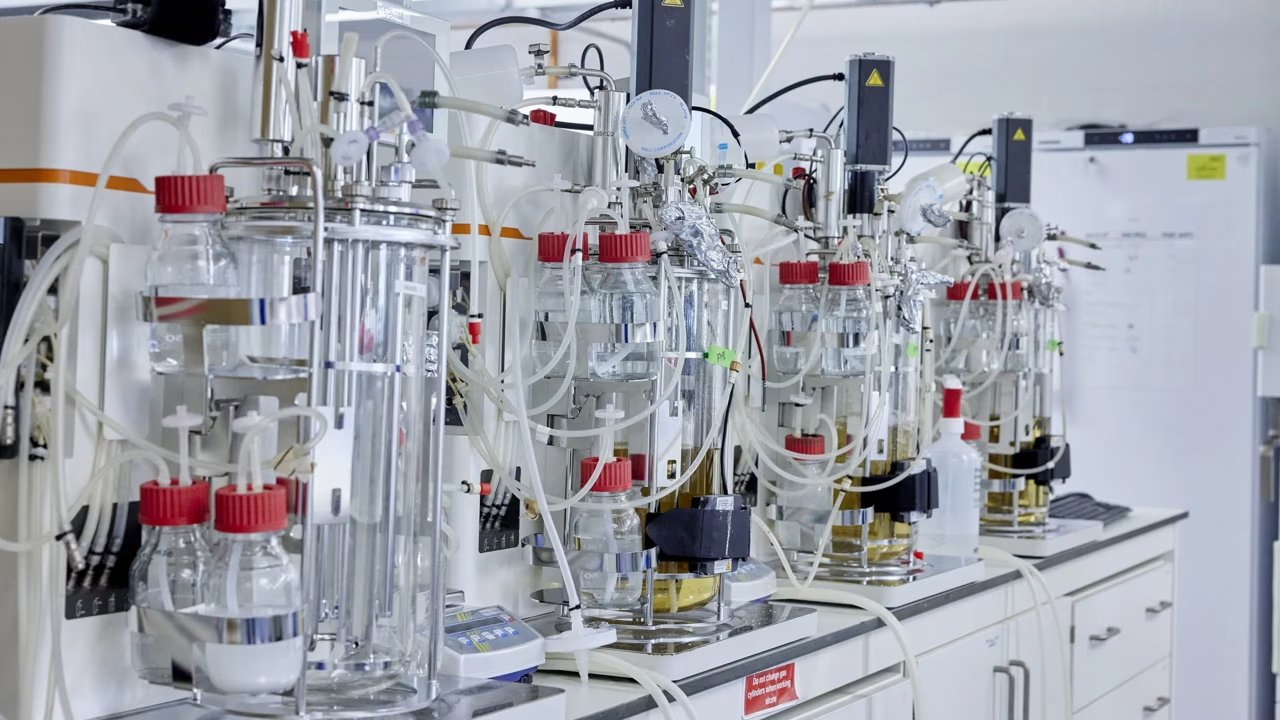When the interviewee reached out to tell me about a kind of tech I’d likely never heard of, my interest piqued. And reader, they were right.
Grant Aarons is the co-founder and CEO of FabricNano, a synthetic biology company that transforms chemical processes using cell-free biomanufacturing technology to make products that are more sustainable and, thus, less reliant on fossil fuels.
Specifically, it develops biocatalysts to enable the profitable production of sustainable and bio-based chemicals to be used in products such as cleaning products, bio-pharmaceuticals, bio-fuels, and bio-plastics.
What does this mean in practice and why does it matter? I met with Adams at WebSummit 2023 to find out more about the novel tech. Let’s break it down.
Aarons explains:
“We work in the space of cell-free biomanufacturing. It's kind of the intersection of climate technology, synthetic biology, and industrial transformation."
The company hopes that the same basic chemical reaction as fermentation will power the global chemicals market.
According to Aarons:
“There's a lot of promise in biology. If we think about all the materials that humans need, and the materials that we consume every day, if it's not glass, concrete, or wood, we're essentially talking about petroleum-derived chemicals, which today account for 10% of global greenhouse gas emissions.
And so if we're using all these other materials that are made from petroleum, why can't we make them from biology?”
Erm, but what’s a biocatalyst?
Good question. Biocatalysts refers to the use of biological systems to speed up (catalyse) chemical reactions. Enzymes are a type of protein that act as biological catalysts, increasing the rate of chemical reactions within cells without being consumed or permanently altered in the process.
For example, the yeast in beer uses a cascade of enzyme biocatalysts to turn sugar into alcohol. The enzymes in your stomach and intestines are biocatalysts that break down food so your body can absorb it.
However, enzymes struggle to survive outside of cells, with most of the enzymes being destroyed or degraded within a few hours outside of a cell. This makes it hard to biomanufacture anything using enzymes at scale.
Aarons explained that in the early 2000s, dozens of startups spent billions trying to engineer whole cell microbial biocatalysts, to produce bio-based and sustainable chemicals for the mass market.
However, Aarons characterises most microbial factories as inefficient, slow and unpredictable to scale.
“We want to use those enzymes, the fundamental units of biochemistry, to produce chemicals.
But we need to prevent the fundamental problem with cell-free biomanufacturing, which is that as soon as you take an enzyme outside of the cell, it unravels and unfolds, and the machine doesn't work anymore after about an hour or two. That's not an industrial process.”
Reducing the cost of biomanufacturing
FabricNano collects all the components necessary for biomanufacturing and co-locates them on an artificial surface. The company has tried everything from a nano-wafer fabric made of DNA, to more industrially available materials such as common solid carriers, coffee grinds, and even simple rocks.
Aarons explained:
“At FabricNano, we take enzymes out of cells. So these are non-living, just blocks of machinery material atop carrier materials. Once placed atop the carrier material, the enzyme lasts for six months to a year and can be used economically in an industrial reactor.
Think about a microprocessor or semiconductor. It has transistors, which are the fundamental units of operation, and it has a silicon wafer. The combination is the impact.
So just like Nvidia has learned to put transistors on top of silicon, FabricNano puts enzymes on top of other natural carrier materials, and these two things work together in a synergistic way.”
The enzyme is now very durable and stable and, therefore, can be better used to manufacture commodity chemicals like bio-plastics, bio-fuels, and certain types of antibiotics that are made using enzymes.
Furthermore, these biocatalysts are what is known as “drop-in,” so they can just go into pre-existing industry equipment and know-how (such as packed bed or continuous stirred tank reactors).
Aarons sees FabricNano’s biggest market traction in efforts to remove ingredients like petroleum in products such as cleaning materials, with a particular interest in detoxifying the planet” and “detoxifying the home”.
The company has successfully created chemicals like 1,3 propanediol from glycerin, a major waste product of biodiesel manufacturing. 1,3 propanediol is an ingredient that can replace fossil-fuel based polyethylene glycol in consumer products, such as shampoo.
Aarons asserts:
“It's so weird to say out loud, but the future of this technology is that everyone should have access to any bio-based material conversion that they need in the palm of their hand when they need it.
And that's the promise. Without really big equipment, without high temperature, without high pressure, you will have biology in your hand in the form of a powder to do whatever you need, clean your clothes, clean your house, and even prevent stomach indigestion.”
FabricNano plans to commercialise its efforts by producing cell-free biocatalysts and/or licensing enzyme sequence IP designed to bind natural carrier materials so that clients already using enzymes can improve their processes and/or products.
The licensing approach allows clients to benefit from FabricNano’s platform when the enzymes have already been developed but still struggle to perform in cell-free environments because they were never evolved for the necessary stability and performance required as cell-free biocatalysts.
FabricNano’s clients range from startups to international chemical clients like Sumitomo Chemical Company.
The company is backed by Atomico and Hoxton VC, and prominent angel investors including Emma Watson (UN Ambassador and actress), Biz Stone (Twitter founder), former Bayer executive Alexander Moscho, and Tania Boler the founder of womens’ health brand Elvie.
Lead image: FabricNano. Photo: uncredited.



Would you like to write the first comment?
Login to post comments